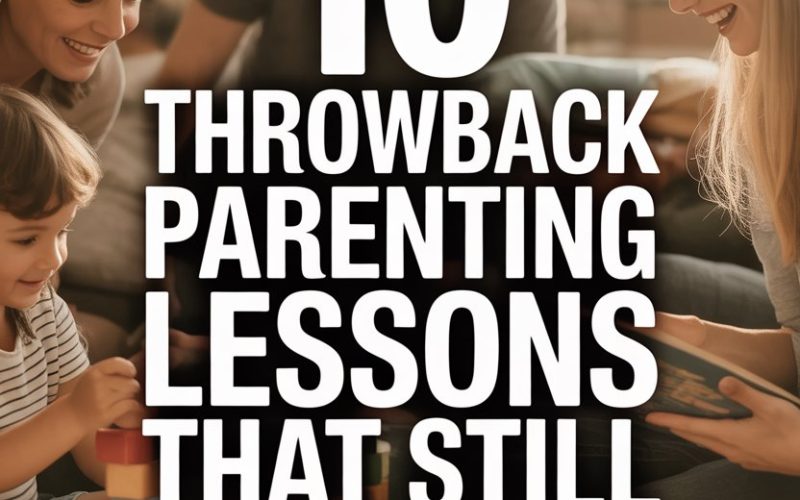Tiny humans come with zero instruction manuals, and yet somehow, our grandmothers managed to raise entire flocks of them—with no baby monitors, zero parenting blogs, and a distinct lack of Instagram-worthy milestone boards.
If your brain currently resembles a browser with thirty open tabs (one just for sock-matching), it’s tempting to hunt for shiny new parenting hacks at every turn.
Yet some of the best advice was handed down around kitchen tables—sometimes with a cuppa, sometimes with a firm “Because I said so.” Turns out, a few old-school lessons still pack a punch for today’s busy families.
Put the quinoa puffs down for a minute. Let’s revisit 10 classic nuggets that absolutely hold up.
1. Say No, and Mean It
Modern parenting can feel like refereeing a never-ending negotiation. “But why? But what if? But you said last Thursday, Mum!”
Here’s the thing: a solid, confident “no” still works wonders.
Consistency breeds security. Recent research from the University of Minnesota showed that children with clear, consistent parental boundaries actually exhibit lower levels of anxiety and better self-control.
It’s not about being harsh; it’s about showing kids there’s a grown-up steering the ship—even when they’re clinging to the mast.
If “no” gives you hives, try “That’s not happening tonight,” or “I hear you, but the answer’s the same.” Your future self, and probably your GP, will thank you.
2. Family Dinners Matter
Remember when “tea” meant everyone at the table, sharing food and the odd complaint about brussels sprouts? Not just a throwback photo op—family meals have genuine power.
A study from Harvard found that kids who eat with their families at least three times a week have healthier eating habits, better vocabularies, and fewer behavioural issues.
Don’t fret about making it Instagram-perfect. Fish fingers and beans, eaten together, do the job. It’s the togetherness that counts (though you might want to keep the ketchup wrestling to a minimum).
3. Boredom Builds Brains
“We’re bored!” echoes through every home eventually, often at a pitch that could shatter glassware. Grandparents didn’t treat boredom as a crisis—they saw it as the prelude to creativity.
Letting kids stew in a little boredom encourages imagination, resourcefulness, and grit. Researchers at the University of East Anglia found that unstructured time helps children develop problem-solving skills and emotional resilience.
So, the next time you hear the dreaded phrase, resist the urge to whip out a screen or plan an activity. Boredom is your secret parenting weapon.
4. Chores Aren’t Child Abuse
Back in the day, a child’s list of chores could rival a small farmhand’s. While you don’t need to hand your five-year-old a scythe, giving kids age-appropriate responsibilities builds self-worth and a sense of contribution.
According to psychologist Marty Rossmann, children who did chores grow up to be more successful, independent adults.
Start small—think tidying toys or feeding the dog. You’re not running a sweatshop; you’re raising a capable human.
5. Outside Beats Inside
Screen time is the new bogeyman, but kids used to play “outside”—that mystical land of mud, sticks, and the occasional scraped knee.
Fresh air isn’t just good for little lungs; outdoor play supports healthy sleep, stronger immunity, and better mental health.
The American Academy of Pediatrics recommends at least 60 minutes of unstructured outdoor activity daily. Even if it’s just the back garden or a stomp around the block, a bit of dirt under the fingernails is still a badge of honour.
6. Praise Effort, Not Genius
“I’m so proud you worked hard on that puzzle” trumps “You’re so smart!” every time. Our elders knew how to cheer for the struggle, not just the outcome.
Carol Dweck’s research on growth mindset shows that children praised for effort and persistence grow into adults willing to tackle tough challenges. Celebrate the try, not just the trophy.
The next time your child brings you a lopsided drawing of the cat, resist the urge to label them the next Banksy—focus on the dedication it took to make those whiskers.
7. Manners Matter
Table manners, please-and-thank-yous, not interrupting—those little courtesies were non-negotiable for previous generations. Turns out, they’re still magic for smoothing social situations, and not just for the Queen’s garden party.
Research from the University of Cambridge links early teaching of manners to greater empathy, higher emotional intelligence, and better friendships.
It’s not about producing tiny etiquette robots, but about helping your child understand respect and kindness in daily life (even if their sleeves never quite stay out of the soup).
8. Bedtime Is Sacred
The nightly routine—bath, story, lights out—may seem old-fashioned in a world where schedules are upside down, but regular sleep is the foundation of sanity for kids and parents alike.
Studies from the National Sleep Foundation show that consistent bedtimes lead to better mental health, stronger immune systems, and improved learning.
Life will throw the odd curveball, but sticking to a predictable routine most nights gives everyone a fighting chance at getting the rest they need.
Hint: if you’re down to reading “just one more story” for the third time, you’re not alone. It’s practically a rite of passage.
9. Your Word Is Gold
“Because I said so” might sound like a power move, but what really matters is that your promises—big or small—hold weight. Reliability builds trust.
If you say you’ll play a game after dinner, follow through. If you lay down a consequence, stick with it (even if you’d rather not confiscate that beloved tablet).
Psychologists agree that children raised with reliable, predictable parents feel safer and more secure.
Will you mess up? Definitely. But admitting it, apologising, and trying again makes your word even stronger.
10. Less Is More With Toys
Back in the ‘80s, a cardboard box could entertain kids for hours—no Wi-Fi required. Today’s toy aisles are a technicolour jungle, but research suggests that fewer toys actually spark richer play.
A study from University of Toledo found that children engage more deeply and creatively when they have access to a smaller selection of toys.
So before you Marie Kondo the lot, just remember: a few open-ended, well-loved toys beat a mountain of blinking plastic every time.
Throwback Wisdom for Modern Chaos
Some things never go out of style—mum’s roast spuds, questionable dad jokes, and parenting advice that’s been passed down through generations.
Sure, there’s a new app for just about everything, but the heart of raising good humans hasn’t changed that much.
When life gets hectic and you’re wondering if you’re getting anything right, pull out one of these tried-and-tested lessons.
They worked before TikTok, before nappy genies, before “gentle parenting” was a hashtag—and they’ll work long after your little ones are towering over you, still asking what’s for tea.
And if anyone questions your methods? Just tell them science is on your side (and so is Nana).




